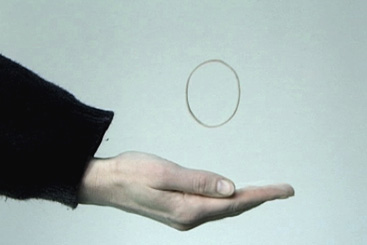
Born in 1960 in Ypres (BE). Lives and works in Tournai (BE)

1997
Video colour, no sound
durée : 6'05''
Year of Purchase: 2008
Edith Dekyndt’s work employs a timeless repertoire of physical facts which, although registered empirically, open onto illusion and the uncanny. Ghostly and yet material, her project makes us aware of the working of the world. By focusing our attention on a minimal action that remains tied to natural elements and phenomena (irisation, air and water currents, etc), without tampering with reality, the artist’s creative gesture becomes an experimental way of being in the world. At the same time, it guides our eye to contemplate water, color, air, and space, thus awakening our curiosity about the fabulous character of the mechanisms that govern our life.
At odds with the hustle and bustle of everyday life, Slow Object 04 (1997) belongs to a video series begun in 1997 which focuses on the slow mobility of different elements. In this case, the close-up video shows delicate manipulation of a rubber disc bobbing up and down in slow motion in an aquarium. As if in a state of weightlessness, the object bends and slightly deforms, barely altering its shape. Although everything is in the open, the eye needs time to acclimatize and understand the strange motivity of the object.
Encountering the work is like entering a dream: it’s that moment of dislocation when reality begins to be dysfunctional but remains sufficiently meaningful so that it doesn’t clash with its structural referents. Rather than resort to artifice, Edith Dekyndt guides the viewer’s gaze to a pivotal point where everything becomes unhinged, and ushers in dream desire in an effort to produce disorientation.
As much symbolic as it is natural, the recurring appearance of the artist’s hands in her videos plays the role of a tuning fork that sets the tone of sensible human experience in grips with the real. Like a primitive implement, seemingly insignificant but in fact essential, the hands mediate the intelligibility of the surrounding world. The manipulation, which corresponds to the handling of an instrument rather than to a maneuver meant to distort reality, invites the viewer to look at the world the way one would at an unfamiliar object, picking it up and turning it around in order to analyze it. Like a child who discovers the world, Dekyndt’s work courts that ever-refreshed innocence, keen on according time to attention and concentration necessary for the beauty of the “insignificant” to reveal itself. This sensible position has nothing to do with an angelic posture; it is akin to a force of calm: a serene, quasi-unshakable presence which acts without disturbing, paving the way for an ethics of universality, for the non-obsequious respect for the world and its contingent forces.
Cécilia Bezzan